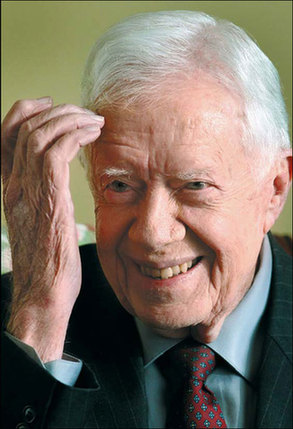Carter recalls his lifelong fascination with China
Updated: 2011-12-15 07:17
By Mike Peters (China Daily)
|
|||||||||||
BEIJING - When a 7-year-old farmboy in Plains, Georgia, opened a package from his seafaring uncle nearly eight decades ago, he found a delicate model of a wooden Chinese junk - and at that moment a lifelong fascination with China was born.
 |
|
Occasional friction won't derail ties between China and the US, former US president Jimmy Carter said in an interview with China Daily in Beijing on Wednesday. Photo by Wu Zhiyi / China Daily |
"Then later when I was in the submarine force in 1949, I came here as a young naval officer to visit the same seaports, and I was intrigued with the people of China," he said, noting that when he became president he began the process of normalizing relations with China that began in the Nixon administration.
"So it's been a long process in my life, involving China and my love for the Chinese people."
That sort of exchange was the reason Carter has been in China for the past week, marking the 40th anniversary of Ping-Pong Diplomacy at a series of events.
At a ceremony in the Great Hall of the People that he attended with Vice-President Xi Jinping, Carter said: "It was a very historic moment. But it was that breakthrough just with ping-pong players - that is people-to-people - that was really more important than the decisions of political leaders. And I think that is a stability that is going to prevail in the future."
On Wednesday morning the former president was taping a television spot at the US embassy to support President Barack Obama's campaign for 100,000 Strong - a push to have 100,000 US students studying in China four years from now.
"Now we have 165,000 Chinese students in American universities, and about 13,000 American students in Chinese universities. And in the future, they will be the leaders of our two countries. And they will also be knowing more about each other and the reasons for harmony and cooperation and mutual respect."
Carter said that despite his decades of interaction with China, he's learning about it all the time.
He said one reason for his current visit is China's interest in working with the Carter Center in Africa, for instance, in healthcare programs.
A meeting with a Chinese official, who is in charge of healthcare assistance to Africa, informed Carter of the many programs that China has in Africa to improve healthcare there, involving malaria and many other diseases.
"This was a surprise to me, and I think this is one thing that the rest of the world doesn't acknowledge - or know about - is how extensive China's programs are in improving the quality of lives of people in Africa and in poor countries elsewhere."
Carter is not overwhelmed by issues of discord between the two countries, from regulating the value of the renminbi to US arms sales to Taiwan.
He noted that rhetoric gets ratcheted up from time to time, "especially during US election years". And while some in Congress want to punish China for not moving as far as the United States would like on currency revaluation, Carter said flatly that such a bill would not pass both houses of Congress. "And if it did, President Obama would veto it."
"I think the more rational people in the US Congress - and in the White House - understand that this slight difference of opinion over the value of the Chinese currency is relatively insignificant. I've observed this very closely myself. Five years ago, it took about eight RMB to equal one US dollar. Now it just takes six of them. That's a 22 percent change in the value of the Chinese currency just in the last five years. So change is taking place - not because of comments from Washington but because the Chinese leaders in politics and economics agreed this is best for China.
"Decisions about the US currency should be made in Washington, and decisions about the Chinese renminbi, the yuan, should be made in Beijing."
"We'll always have differences, with our cultural approaches and our political backgrounds, our ancient histories," Carter said.
"But still, the ties that bind us together are much more important than any differences that might arise."
- Anti-dumping tariffs on US auto imports 'fair'
- Actor held after 13 years on the run
- ROK officer death 'isolated case'
- Year of the Dragon predictions
- Children recall horror of crash
- Japan PM to start delayed China visit
- China to maintain prudent monetary policy in 2012
- Train crash hottest on Weibo in 2011
Hot Topics
HIV/AIDS, Egypt protest, Thanksgiving, climate change, global economic recovery, home prices, high-speed railways, school bus safety, Libya situation, Weekly photos
Editor's Picks

|

|

|

|

|

|







